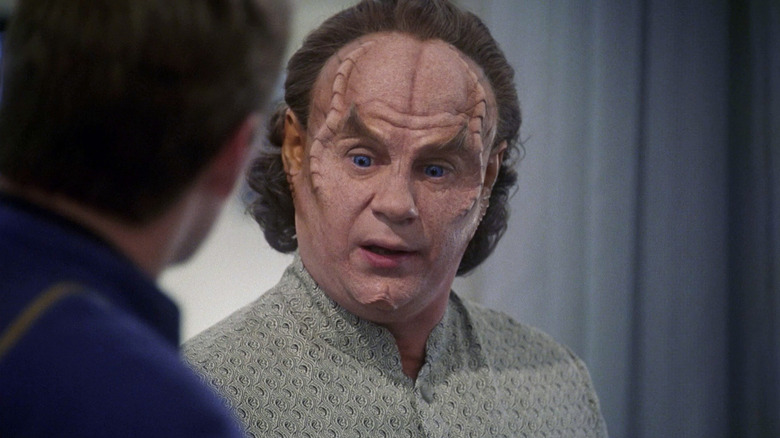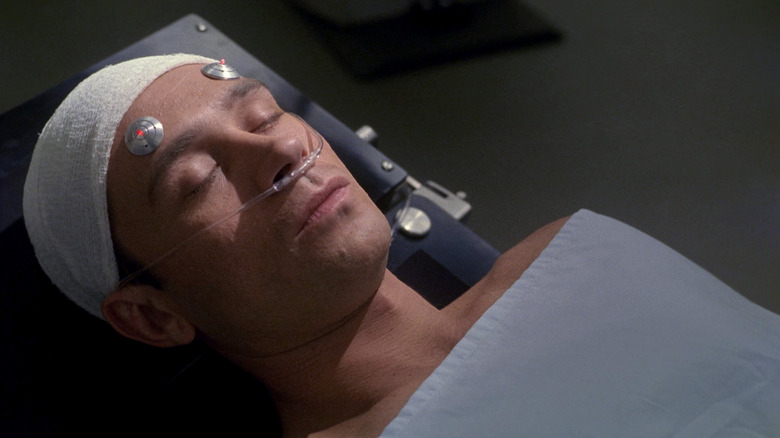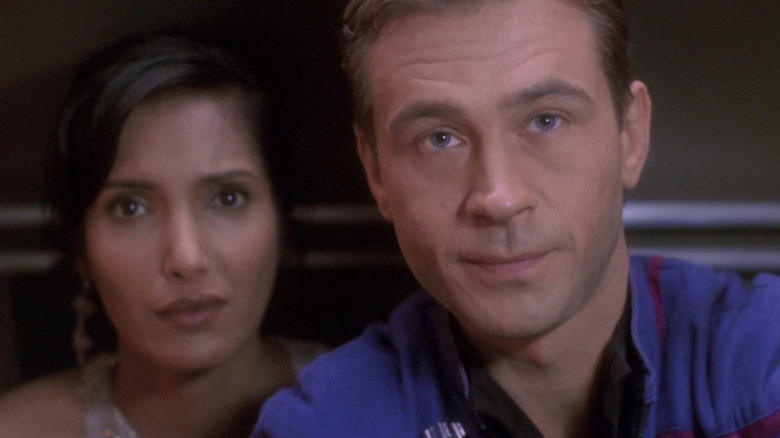John Billingsley's Favorite & Least Favorite Star Trek: Enterprise Episodes
Dr. Phlox, as played by John Billingsley on "Star Trek: Enterprise," may be one of the best characters in the franchise. Phlox was on board the Enterprise as part of a species exchange program, and he was eager to serve among humans, tickled by their optimism and amused by their prudishness. He was a Denobulan, a species with its own set of medical ethics (the will of the patient supersedes an Earth doctor's pledge to first do no harm), leading to some principled discussions of right and wrong. His species also married into vast, complex polycules where each man takes three wives and each woman takes three husbands. When asked if that made things complicated on his homeworld, Phlox smiled impishly and replied, "Yes."
Phlox was always upbeat, however, and was eager to explain cultural differences to curious human seekers. Phlox also practiced weird, but scientifically proven, medical techniques, often using animal excretions and unusual herbs to cure the crew of the Enterprise. He was like your laidback hippie uncle from Venice, California.
Dr. Phlox may be Billingsley's most visible acting role, although he had been appearing on TV since the early '90s, playing supporting parts in shows like "The X-Files," "Northern Exposure," and "NYPD Blue." He was in all 13 episodes of the 2000 sci-fi series "The Others," and, after "Enterprise," would have regular roles on "The Nine," "True Blood," "Intelligence," and "Stitchers."
In 2010, Billingsley participated in a fan-driven FAQ, hosted by StarTrek.com. He was asked his favorite and least favorite episodes of "Enterprise" — that didn't feature Dr. Phlox — and the affable actor had definite answers. Curiously, neither his favorite nor his least favorite were particularly notorious or beloved among Trekkies.
John Billingsley loves the episode where Trip Tucker was cloned
Billingsley was likely biased when it came to Phlox episodes, but outside of his own character, he seemed to focus on episodes that focus on the Enterprise's engineer Charles "Trip" Tucker (Connor Trinneer). He described his favorite thus:
"I'd say the one in which we cloned Trip. I thought that was the best episode for a lot of reasons. Everyone in the cast was involved and everyone had an emotional through-line. Some episodes, of any show, actors are used to convey information or they're shunted aside. That episode, I thought it was the best of our ensemble pieces and it did what 'Star Trek' does best, which is to deal with a topical question that has some sociological significance in a way that brings humanist values into play. And I got to handle a baby."
The episode Billingsley is referring to is called "Similitude" (November 19, 2003), and it has an intriguing premise. Trip is injured in an explosion and falls into a coma. Dr. Phlox, not having any suitable organ donors on board, offers to grow a mimetic clone of Trip, one with a lifespan of two weeks, aiming to harvest its organs for transplant. During the clone's brief life, however, it grows a full consciousness and even some of Trip's memories. It also learns of a procedure that might extend its life beyond two weeks ... and asks to be allowed to live.
The clone ultimately chooses to sacrifice itself to save Trip's life, as he begins growing memories of Trip's mission, and understands that he and Trip are essentially one and the same. The episode is a great ethical conundrum, a miniature morality play that is "Star Trek's" stock in trade.
John Billingsley hates the episode where Trip Tucker went on the lam with a space princess
When asked his least favorite, Billingsley had an answer there too. He answered:
"I think it was the episode with Padma Lakshmi. It wasn't her fault, but she played an alien princess. She and Trip were on the run from whoever was pursuing her. I don't remember all the details. I thought that was an unfortunate episode all around. It just didn't work. Again, no fault of the actors. It just didn't come together. And it was at a touchy point in our second season. We were holding on to not-great, but adequate audience numbers and after that episode our numbers just plummeted and we never got the audience back again."
The episode in question was called "Precious Cargo" (December 11, 2002), and Billingsley is right: it isn't very good. In the episode, the Enterprise is helping an alien diplomat transport a stasis pod containing a woman named Kaitaama (Lakshmi). She is in stasis as a means of saving resources on extended deep-space flights. When the pod malfunctions and Trip sets her free, however, she reveals that she is a kidnapped princess and her caretakers are actually intending to hold her for ransom. The pair end up absconding in an escape pod and going briefly on the lam.
As Billingsley pointed out, "Enterprise" was never a ratings bonanza, and episodes like "Precious Cargo," he feels, are a large reason as to why. The story wasn't terribly interesting, and could have happened on any of the "Star Trek" shows that came before it (and kind of did in the "Star Trek: The Next Generation" episode "The Perfect Mate").
One might assume that if he had been allowed to pick Phlox episodes, though, Billingsley would have tilted in that direction.


